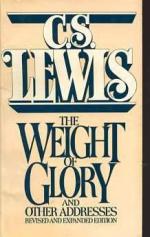
|
| Name: _________________________ | Period: ___________________ |
This test consists of 15 multiple choice questions and 5 short answer questions.
Multiple Choice Questions
1. What professor does Lewis quote in "Is Theology Poetry?" as defending evolution simply because creationism is too incredible to believe?
(a) Dawkins.
(b) Darwin.
(c) Watson.
(d) Sagan.
2. What does Lewis say at the end of "On Forgiveness" is the hard part about forgiveness?
(a) To remember to forgive.
(b) To keep forgiving.
(c) To begin forgiving.
(d) To ask for help in forgiving.
3. Which author does Lewis quote in "Membership" as saying that to be happy at home is the end of all human endeavor?
(a) Johnson.
(b) Wordsworth.
(c) Byron.
(d) Keats.
4. In "Membership", Lewis cautions against mistaking necessary evils for what?
(a) Fate.
(b) Justice.
(c) Absolute evils.
(d) Good.
5. In "The Inner Ring", Lewis says what about the existence of inner rings?
(a) It is evil.
(b) It is unavoidable.
(c) It is avoidable.
(d) It is good.
6. "Membership" states that unity is the road to what?
(a) Pleasure.
(b) Peace.
(c) Personality.
(d) Freedom.
7. With what famous author does Lewis begin "The Inner Ring"?
(a) Bacon.
(b) Wordsworth.
(c) Tolstoi.
(d) Shelley.
8. When discussing Christian solitude, Lewis says that Christians are called not to _____________ but to membership in the mystical body.
(a) Charity.
(b) Solitude.
(c) Individualism.
(d) Worship.
9. Lewis states in "Membership" that _____________ is a quantitative term and that therefore love knows nothing of it.
(a) Personality.
(b) Obedience.
(c) Humility.
(d) Equality.
10. To which poet does Lewis refer in "The Inner Ring"?
(a) Byron.
(b) Frost.
(c) Shelley.
(d) Bacon.
11. Lewis says, when discussing the inner ring phenomenon, that we hope for tangible profit from every ring such as all but which of the following?
(a) Power.
(b) Love.
(c) Money.
(d) Liberty.
12. According to "On Forgiveness", it is a safe bet in regard to the sins of others that the excuses are what?
(a) Completely irrelevant.
(b) Sufficient for God.
(c) Better than we think.
(d) Not as good as we think.
13. According to Lewis's discussion of religion in private life, this phenomenon can be seen even where?
(a) In society.
(b) In the workplace.
(c) At university.
(d) In church.
14. According to "Is Theology Poetry?" why are fairies popular in England?
(a) They are a childlike delight.
(b) They represent human virtues.
(c) We have substituted them for ancient mythology.
(d) We don't think they exist.
15. According to "On Forgiveness", what part of forgiveness are we responsible for taking to God?
(a) Circumstances.
(b) Prayer.
(c) Excuses.
(d) Sin.
Short Answer Questions
1. Lewis says, when discussing forgiveness, that very often when praying he finds that he has asked God not to forgive him, but for what?
2. In the opening of "On Forgiveness", Lewis says what about believing in the forgiveness of sins?
3. According to "On Forgiveness", it is a safe bet in regard to our own sins that the excuses are what?
4. According to Lewis's discussion of membership, what did St. Paul mean by the word "members" in the original Greek context?
5. According to "On Forgiveness", we believe that God forgives sin but that He will not do so unless what?
|
This section contains 529 words (approx. 2 pages at 300 words per page) |

|




